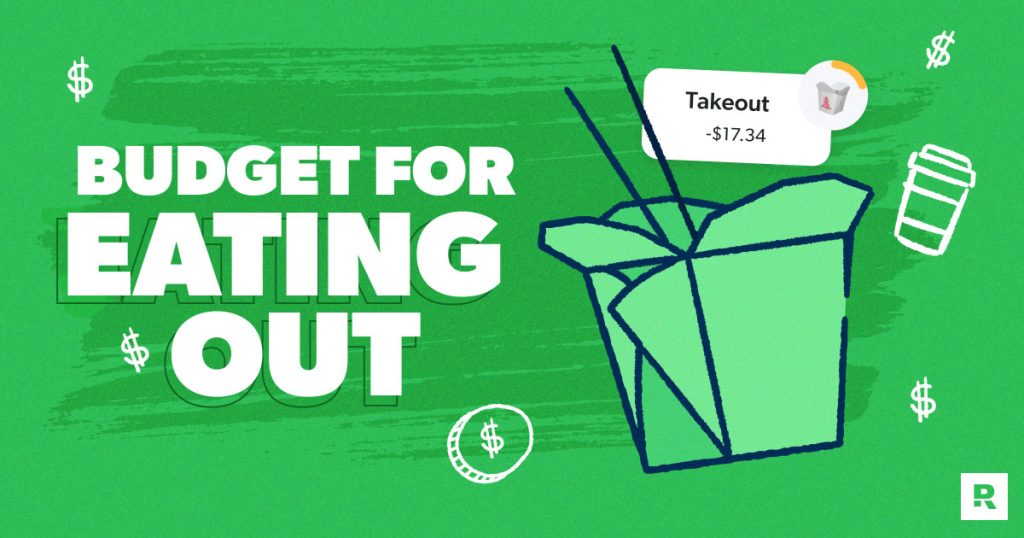Food. It’s the third-highest expense for Americans and usually people’s biggest budget buster.1
Whether it’s your daily coffee run, lunch with your coworkers, or a last-minute dinner via Postmates, eating out isn’t cheap—especially as food prices continue to go up.
But just how much should you spend eating out each month? Let’s talk about it!
How Much Do Americans Spend Eating Out?
Americans spend an average of $3,639 eating out each year—roughly $300 each month.2 And those fast-food meals and restaurant tabs continue to add up. In fact, Americans spent 20% more eating out in 2022 than they did in 2021.
On average, people say they eat out three times a month and order delivery between four to five times a month.3
But just because the average person spends $300 a month eating out, it doesn’t mean you have to do the same. Ultimately, your eating-out budget should make sense for you and your money goals.
How Much to Budget Each Month for Eating Out
How much you should spend eating out—and for food in general—depends on several factors, including your family size, income and financial situation. Because it’s going to cost more to feed a family of four than it will to feed a family of two at a restaurant.
Here’s how much families spend eating out, on average, based on size:
- A single person household spends $206 per month eating out ($2,467 per year).
- Married couples without kids spend $335 per month eating out ($4,018 per year).
- Married couples with kids spend between $462–519 per month eating out ($5,543–6,225 per year), depending on the age of their kids.
- Single parents (with at least one kid under the age of 18) spend $280 per month eating out ($3,362 per year).4
Now, these numbers can help you estimate your own budget, but they don’t work for everyone. Instead of focusing on what other people are spending, the best thing you can do is focus on your own financial goals.
Are you trying to pay off debt? Do you need to save more for emergencies? Is investing for retirement your priority? The quickest way to make progress on any goal is to cut back on your eating-out budget—or even to cut it out completely (yeah, we’re serious).
We’re not saying you have to swear off restaurants and takeout forever. But if you’re feeling stressed out by bills, debt payments and not having enough in your savings, you need to make some sacrifices, starting with your food budget. Because here’s the deal: Eating out is not a necessity—it’s a luxury. And that’s money you could use to reach your goals faster.
So, start by creating a budget based on your income and specific financial goals. Then, adjust your eating-out budget line accordingly (even if that means setting it to zero so you can throw all your extra money at your debt).
Once you’re debt-free or you’ve hit your savings goal, you can add eating out back into your budget—because then you’ll have the money for it!
How to Stop Eating Out So Much
If you’re in a place financially where you can still include eating out in your budget, there are plenty of ways to make it less expensive. You can save money at restaurants by splitting meals, skipping the expensive drinks, and finding the best happy hour deals.
But if you want to cut down on your overall eating-out costs, here are some ways to help you get your cravings under control.
Take the Time to Meal Plan
The top two reasons people say they’d rather eat out is because 1) they don’t feel like cooking and 2) eating out is more convenient.5 And hey, we get it. Eating out is usually easier and quicker than making a meal at home. But meal planning can help!
Try our free Meal Planner to save money on groceries!
It doesn’t have to be complicated or overwhelming. Just choose a couple of budget-friendly recipes (bonus points if they use ingredients you already have), and then decide which nights you’ll cook and which nights you’ll have leftovers. Then, whenever you’re tempted to swing through the drive-thru, you can tell yourself, We have food at home.
Change Up How You Treat Yourself
Busy morning? A $6 coffee will get me going. Rough day at work? A quick lunch delivery will make me feel better. Made it to the weekend? I deserve to treat myself to a nice dinner!
Whether we’re feeling high or low, it’s easy to justify eating out to help us cope with our emotions. But treating yourself once often turns into treating yourself five times a week. At that point, it’s not a treat—it’s a habit.
Start by giving yourself a predetermined amount of “treat yourself” cards to use during the month. It could be several small treats or one big treat, but having a limit will keep you from blowing your budget. Also, what if you treated yourself to something besides eating out? You could go on a walk, chat with a friend, or do a hobby you enjoy. There are plenty of cheap (or free) ways to reward yourself!
Make Socializing Less Expensive
Around 44% of people say they prefer to dine out because they want to socialize.6 Yes, going out for a nice meal is a fun way to catch up with friends. But it doesn’t have to be the only way.
Don’t be afraid to ask a friend to meet you for coffee or tea rather than a full sit-down meal. And instead of going out to an expensive restaurant with a group of friends, you could take turns hosting at each other’s houses. Everyone can bring their own dinner, or you could do a themed potluck. Remember, you don’t have to spend a ton of money to spend time with your people.
Skip the Delivery App Fees
Delivery apps like Postmates, Uber Eats, Grubhub and DoorDash are convenient—but super expensive.
Not only are you charged for the meal itself plus tax, but also the service fee, delivery fee and tip for the delivery person. Most of the time, you end up paying more for the delivery than you do for the actual food (it’s ridiculous)!
So, count the cost before you let your late-night cravings steer you into overdraft. Or at least choose the pickup option and save yourself a good chunk of change on the delivery fees.
Get on a Budget
The best way to save money on eating out (or anything else) is with a budget. Having a plan for your money before the month begins lets you know exactly how much you can spend in each area. And you can easily adjust your spending during the month to stay on track toward your goals.
The EveryDollar budgeting app makes it super easy to create a budget and stick to it (which is the most important part). So, if you’re ready to get your food budget—and the rest of your money—under control, go ahead and create your EveryDollar budget for free!
Read the full article here












